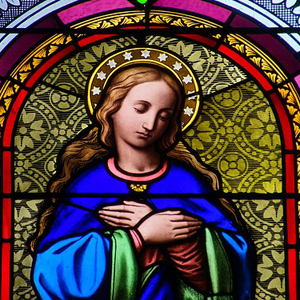
This is an old question that has been asked many times. The short Catholic answer is no. Tradition is clear that Mary never had other children after Jesus. In fact, one of the four Marian dogmas is that Mary remained a virgin perpetually, meaning that she never had any sexual relation with Joseph, since she was fully the spouse of the Holy Spirit, and Joseph was only there to protect her and to be the foster father of Jesus.
But, let’s also take a deeper look into the biblical text.
The controversy comes from the following biblical references:
Matthew 12:46 (Cf. Mk 3:31-32, Lk 8:19-20)
While he was still speaking to the people, behold, his mother and his brethren stood outside, asking to speak to him.
Matthew 13:55-56 (cf. Mk 6:3)
Is not this the carpenter’s son? Is not his mother called Mary? And are not his brethren James and Joseph and Simon and Judas? And are not all his sisters with us? Where then did this man get all this?”
From the above, it seems that Jesus had brothers and sisters, and the names of the brothers are James, Joseph, Simon and Judas (or Jude).
Some argue that because Jews often call cousins and half-brothers “brothers”, and likewise for sisters, this is not proof enough that these “brothers” were blood brothers of Jesus, or at least they could be children of Joseph from a previous marriage, and Mary was betrothed to him after he was widowed. Or, according to Eastern tradition, these children were actually children of Joseph’s brothers who passed on, and Joseph took them in as his own children. The biblical evidence for that is that though these are called brethren of Jesus, they were never called children of Mary. Some, however, insist that this argument is still too weak.
Two of the brothers listed, however, are known in the bible, namely James and Judas (or Jude). James in Acts and the letters of Paul and his own epistle James was called “brother of the Lord” and an apostle. Jude was called “brother of James”. The straightforward understanding is that these two were both brethren of Jesus and were apostles.
But wait, in the list of the apostles, we have two James. This is obviously not James the son of Zebedee. In Luke’s list (Lk 6:15-16) we have James the son of Alphaeus and Jude “of” James. (Matthew has Thaddeus instead but it was widely accepted in the early Church that Thaddeus was Jude.) Some translation translated this “of” as the son of James, but the original text simply means someone very close to James. In Jude’s own epistle, he stated he is the brother of James, and there was no doubt in the early Church that this author was the Apostle Jude.
So, two of the four named brothers were not children of Joseph, but children of Alphaeus! How were they related with Jesus for them to be called “brethren”? Was Alphaeus a brother of Joseph the carpenter?
At the crucifixion, some of the gospel accounts listed the names of the women standing by. Particularly, we have:
Matthew 27:56
among whom were Mary Mag’dalene, and Mary the mother of James and Joseph, and the mother of the sons of Zeb’edee.
John 19:25
…But standing by the cross of Jesus were his mother, and his mother’s sister, Mary the wife of Clopas, and Mary Mag’dalene.
There is a strong tradition that this “mother of James and Joseph” in Matthew is the “sister of mother Mary” in John.
Admittedly, this last part is weak, since there indeed were many Mary’s and many of them could have children named James and Joseph. However, if Mother Mary’s sister’s children were the same James and Joseph in the earlier list, then indeed they would be called “brethren” of Jesus.
Even if this second portion of the argument is lacking, the first part regarding James and Jude being both well known in early Church as the original apostles as well as brethren of the Lord, yet Luke, who knew well these people, called them explicitly children of Alphaeus, then the chances that these two James and Jude are not the James and Jude named “brethren of Jesus” are minimal.
in other words, the scriptural evidence strongly supports that at least James and Jude were actually cousins of Jesus, with the possibility that either their mother being Mother Mary’s sister, or their father Alphaeus being a brother of Joseph the carpenter or a close relation of Mary. If that is the case, then it is very possible that the other so-called brethren and sisters of Jesus were actually cousins and half-siblings.


